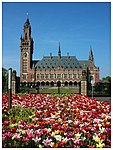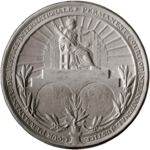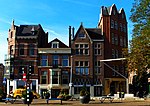The Hague Academy of International Law
The Hague Academy of International Law (French: Académie de droit international de La Haye) is a center for high-level education in both public and private international law housed in the Peace Palace in The Hague, Netherlands. Courses are taught in English and French and, except for External Programme Courses, are held in the Peace Palace. The Academy is notable for its Summer Courses Programme. The Academy's alumni, faculty, and administration have included heads of state, foreign ministers, ambassadors, 12 judges of the International Court of Justice, one former Secretary-General of the United Nations, Boutros Boutros-Ghali and two Nobel Prize recipients.
Excerpt from the Wikipedia article The Hague Academy of International Law (License: CC BY-SA 3.0, Authors).The Hague Academy of International Law
Carnegieplein, The Hague Centrum
Geographical coordinates (GPS) Address Website Nearby Places Show on map
Geographical coordinates (GPS)
| Latitude | Longitude |
|---|---|
| N 52.0866 ° | E 4.2955 ° |
Address
Vredespaleis
Carnegieplein 2
2517 KJ The Hague, Centrum
South Holland, Netherlands
Open on Google Maps











